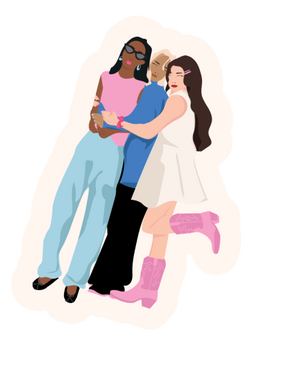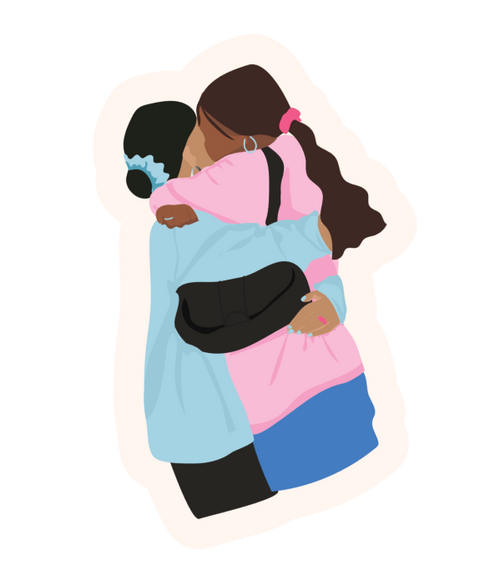6 coping mechanisms for children with alcohol-dependent parents

My counsellor recently asked me what I would consider, the most psychologically tough ‘would you rather’ question. Even more psychologically tormenting than the classic parent-sex-join-in-once-or watch-forever dilemma. He asked me to choose between two magic wands. One of these wands would mean my Mum got better and beat her alcohol dependency, and the other one meant that I would be okay, no whether she did or didn’t. I chose the first. As did my twin, when I asked her.
After this, he rephrased the question. This time he asked me to choose between two different wands. One which got rid of a ‘problem’ and the other which meant I would be okay, no matter what the problem was. It sounded different that time.
Growing up as a child of an alcoholic can feel relentless; it can feel like you’re chained to a fate over which you have no control. The word I would use to describe it is powerless – like more than anything, all you want to do is jump into the body of your parent and save them from themselves, to save yourself from them – but you can’t and you never will be able to do that.
What you CAN do, however, is choose yourself. You can choose the second wand. You can give yourself that kindness.
Below are some tips that I have both learnt myself and been taught – none of which change the problem, but they do help you feel okay about the problem.
6 coping mechanisms for children with alcohol-dependent parents:
1. Set boundaries and remember you are not responsible
I cannot stress this one enough. As my counsellor recently taught me, commonly for children of parents with alcohol dependencies, we learn a script at an early age that simply says ‘I need to fix this to survive’. It’s our interpretation of the world – our compulsion to read a room, and be whatever that dynamic requires us to be. To BE whatever is needed of us to ‘fix’ the situation – until our own needs feel almost unrecognisable.
Learn to recognise your own needs. Recognise when your actions seem to be coming from a place of compulsion. Can you feel desperation tugging at your actions, rather than a place of wellbeing? Do you really want to do this? Has anyone actually ASKED you to do?
It’s hard to swallow but as we all know, our actions don’t affect whether they drink or not. We can’t fix it. So stop trying. As impossible as that may feel. As much as that may feel like the tectonic plates of your mind shifting – it’s true. And you know that. So set a boundary – don’t always come home when you feel needed. Don’t answer the phone if you can’t. Don’t hide bottles. Ask yourself, what protects me?
For further reading on this, check out: Codependent No More: How to Stop Controlling Others and Start Caring for Yourself by Melody Beattie
2. Reach out for help; look into therapy
I am not saying for one second NOT to talk to friends – but we both know the impact that it can have when you talk to a friend who doesn’t understand. The truth is, most people won’t. Their own inexperience around the issue and their own bias and caricatures of alcohol dependencies may mean they dismiss or brush off what you say. Their platitudes may ultimately hurt more than they heal. None of which is their fault.
What I am saying is find people who DO understand. Therapy and counselling can be so essential as a space where you can constructively and safely discuss traumatic experiences and your own behaviours. It is useful because they DO understand and they can help explain why certain things happen and, crucially, how to look after yourself and de-construct unhealthy learnt behaviours. And don’t feel like it’s not an option because of price either – there are affordable and free options out there.
Charities like Mind offer affordable counselling based on income, and charities like ‘We Are With You’ offer free support. You can also use free helplines like Nacao if you just need to talk to someone. Nacao also has other great support recommendations like personal stories that you can read if you need to feel a bit less lonely in all of it or a list of resources and communities that you can reach out to on this page. Try a bit of them all if you need to. You can take it at your own pace and your own level of commitment.
3. Mindfulness
I know, I know… but seriously mindfulness. If there’s one thing that can plague us like nothing else, it’s worry. What are they doing now? Will they be okay? Have they had a drink – or am I just imagining it? Why are me and my family arguing about it now? It can be so damn hard to stop the voices racing. We may be good when it comes to moments of crisis, but it’s the moment of calm that can get us.
So, just TRY mindfulness. You can not be good or bad at it. It’s a practise thing and I am definitely at the beginning of my journey. All I’m saying is give it a go – it can help give you moments of peace when you’re just being.
Try out Headspace if you’re more of an app person OR if you like a book, try out Mindfulness, A Practical Guide to Finding Peace in A Frantic World by Mark Williams and Danny Penman.
4. Find your ‘thing’
This is especially relevant if you still live at home with your parents. Find the ‘thing’ that gives you your escape – it doesn’t have to be expensive; I’m not talking about gym classes or anything too elaborate. Just find the thing that makes you go into your own zone, that helps you remember what makes you YOU away from the drama. If you haven’t found it yet, have fun trying to. Pick up a pen. Go for a jog. Go for a run. Go for a full-on sprint. Try painting – even if you’re shit at it. Once you find it, it will always be there for you.
5. Stay safe
This one is related to what I first mentioned about setting boundaries – but, explicitly, remove yourself from situations that look dangerous. Even though you may love them, alcohol dependencies can make parents and carers violent – and, if you can remove yourself from that, then do. I know we’re not always as lucky as to have a choice – but when you can, do. And if you can’t, I know it will feel heartbreaking, but you have to prioritise yourself. If you need to call someone, make the call. Don’t keep the secret safe for them if it means endangering yourself.
6. Build a future based on YOU. Build a future that is FUN
To me, this is the most important one. Trying to make decisions when you feel chained to a fate and happiness other than yours can feel like driving with mud on the windscreen. It’s hard to make decisions about what path you’re on when you can’t see clearly.
Just know, from someone who gets it, that it’s not selfish to make decisions to move away. To make decisions that make the word ‘abandoned’ float through your head.
I know there is something inherently dismissible about a title like the ‘6 C’s’ but remind yourself of them too:
I didn’t cause it
I can’t cure it
I can’t control it
I can take care of myself
I can communicate my feelings
I can make healthy choices.
Even consider chucking them on a post it note. The point I’m trying to make is that you don’t need to battle someone’s else fate, you need to make your own life.
You need to make decisions that focus on what makes you happy, what is fun to do. The end goal, your purpose here on earth, is not to ‘fix’, it is to ‘be’. Give yourself that.
Written by Jessica Blackwell
Jessica Blackwell lives in Bristol and is the founder of the community magazine, The Everyday Magazine. Jess also works as a freelance journalist, mostly writing about her own journey with mental health and the impact of dependencies on a family. Her goal is to humanise the discussion around alcohol and to be a relatable voice of support for children of parents with dependencies – when and where she can. When she’s not taking around an hour to write a four sentence bio, you’ll find her messily making a bit of art somewhere, trying to smuggle a cat into her flat or buying some more earrings she doesn’t need. You can find her at @theeverydaymagazine or @jessjaneblack.











